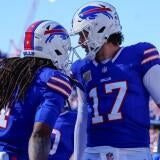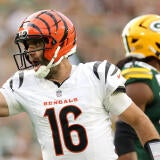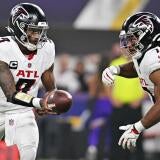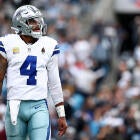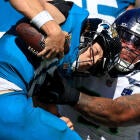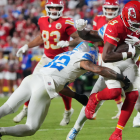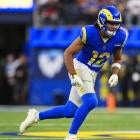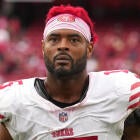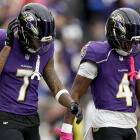How the NFL's two-pronged gambling education strategy is keeping players on the field
As investigations and suspensions mount across other professional sports, the NFL has enjoyed a quiet two years
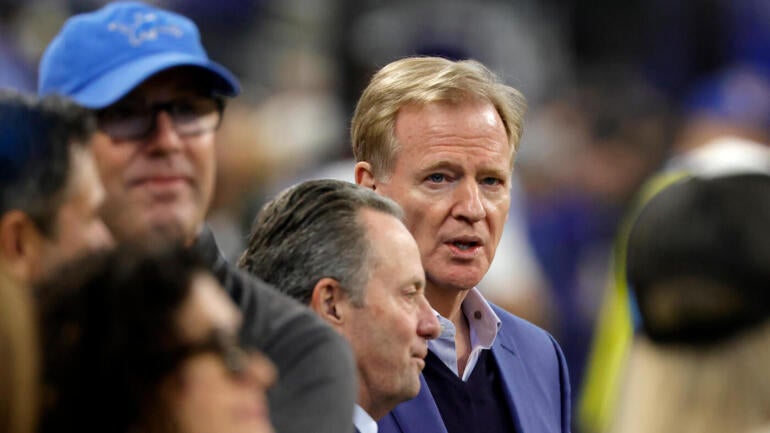
In March of 2022, the NFL suspended receiver Calvin Ridley, then considered one of the best players in the league, for the entire season for betting on NFL games. In 2023, 10 more players -- headlined by Lions WR Jameson Williams -- were suspended for running afoul of the league's rules on sports betting. A crisis was brewing.
Since then, nary a player has been suspended by the league as investigations and suspensions continue to stack up across other professional sports and the college ranks.
The NFL believes there are two major reasons for that. First, the league, along with the NFL Players Association, trimmed some of the fat on sports gambling restrictions that could be confusing at times. Perhaps more importantly, the league enlisted the help of former players to talk to the current ones.
"I think that we've really just kind of really tried to put our arms around making sure that the content we present and who is presenting this is most meaningful," said Sabrina Perel, the NFL's chief compliance officer. "And that [the players] have the opportunity to ask questions if they do have questions.
"I think it's bigger picture -- we really work with everybody in the industry: the regulators, the operators. And everyone is so laser focused on protecting integrity."
Eighteen former players took part in the gambling education process this offseason, the most ever for the league. Warrick Dunn, T.J. Houshmandzadeh, Torry Holt, Chad Pennington and Dante Hall are among the biggest names from the NFL Legends Community that took part in the education this preseason across all 32 teams.
During training camp, following a brief introduction from the head coach, the former player would get started with the league's presentation. Pennington, an 11-year veteran with the Jets and Dolphins, said the most important part was setting the tone early.
"I felt like the players were really engaged, and I think the key to that is our game plan," said Pennington, who presented to the Jets and Commanders this summer. "Here's what we're trying to get accomplished and if I can get these next 30 minutes and really focus in on these major points that we need to understand about the policy.
"Just from my experience as a player, when a coach is very direct and gives me the goals that they had and what we've got to do to achieve those goals and the timeframe I'm all in, right? I think that's what players respect the most is when you're respectful of their time, when you give them the information, when you give them a chance to ask questions."
If only it could be as simple as the NFL enforcing a rule that players cannot gamble on anything, ever. The league doesn't have that right over its players, but the NFL has to ensure the integrity of its game.
Today, the league presents its six rules to players in bullet point format. They expand on each bullet point, but the first one is as clear as day, and it's been a rule for as long as there's been a league.
- NEVER BET ON THE NFL
- Never have someone bet for you on the NFL
- Never share team inside information
- Never gamble at your team facility or while traveling for any game or staying at a team hotel
- Never enter a sportsbook during the NFL playing season
- Never play daily fantasy football
The NFL reserves the right to impose a lifetime ban if a player is found to be match-fixing, though that has never happened in league history. Players would get a two-year ban for betting on their own team's games, and a one-year ban for betting on NFL games not involving their team.
"Whatever it is that can educate our players and protect them from unnecessary risk, I want to do," Pennington said. "And so to me, with the gambling policy and all of the different temptations that are out there and avenues out there to gamble, I want to make sure that our players are informed so they can protect themselves from an unnecessary financial risk. And I certainly don't want a hundred dollar decision turned into a million dollar mistake."
As simple as some of the rules could seem, there are some technicalities that can get confusing. You can be in a casino during the season, but don't step foot in the sportsbook. You can bet on other sports and do multi-sport parlays, but don't include any NFL bets in them. You can "bet" with teammates, but they can only be friendly wagers with no cash value. You can play season-long fantasy football but stay away from daily fantasy football.
How the NFL monitors betting activity
In 2023, the Lions suspended several players after it was found that they bet on non-NFL games while at the team facility. Ridley had included NFL bets in his parlays when he was still a member of the Falcons.
The league caught this because of its integrity monitors. Genius Sport is the league's top integrity monitor, and the NFL uses both IC360 and its own internal resources to make sure everything is above board.
But despite all the best efforts and education, that doesn't confirm there is no impermissible betting taking place. Offshore and illegal gambling markets are much more difficult to monitor than the legal gambling space.
"That's the whole point of [the legal market] is that if it's going to be here, we have a system that is designed to protect integrity, and we get information sharing," Perel says. "And but look, you can't know what's not transparent and visible to us.
"But in some roundabout way, probably somebody is going to find out, whether it's because somebody knows that you were doing this or you incur gambling debt."
There's also mandatory reporting. Players are required to inform the league if they are asked for game information, offered a bribe, asked to fix a game, are aware that someone has violated the policy or if they have a gambling debt of $10,000 or more.
At the end of the half-hour presentation, players are able to ask questions to the presenters. Frequently the question is asked about why the NFL can make money from sports gambling while players must operate under these strict rules.
"And the answer is not only does the NFL profit, so does the player," Pennington says. "With all the profit sharing within the CBA, the same money that you're talking about trickles down to the player as well through the CBA and through the salary cap and things like that. So it's not being hoarded by one entity or another.
"You've got the business piece to it that the players are participating in because of those relationships. And then you have the integrity piece to the game in between the white lines, and those are two separate things."
The league is making millions of dollars from sports gambling sponsors that finds its way into the players' hands. All they must do is not eat the forbidden fruit that comes in the form of those six rules.
And after two years of involving former players in the education, the league may have hit the right bet.
"I think policy presentations by our NFL legends have been received really well due to the fact that we've been in their seat before," Pennington says. "We understand and we can empathize with where they are, and we have some street credibility with that.
"So it's truly been a collaboration in making sure that our players can be successful on an off field. And that's the biggest reason why I participate, is I want every player that comes through the league to have a chance to reach his full potential, both as an athlete and then also financially."


